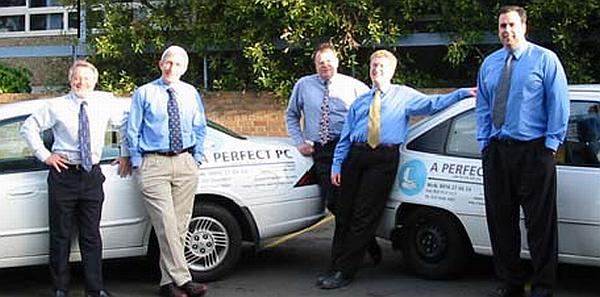A Perfect PC Pty Ltd (Created in 1998)
Some people fear a future full of computers. I see no future without them.>
A Perfect PC Pty Ltd (APPC)
was created with a number of objectives in mind; namely to:
-
make enough money to sustain the activites of Kevin Loughrey (and my family),
-
expose me to the (bruising) experience of running a small business with very little start-up capital but with the aim of providing computing support of all natures to private individuals and to small and medium sized businesses,
-
teach me the essentials related to running a business of any size,
-
provide the means by which I could promote the use of Open Source Software within the Australian Business Community and determine conclusively, in my own mind, whether or not it was truly a cost-effective alternative to the closed source products primarily marketed by Microsoft, and
-
provide the means by which it was possible to "field-test" the concepts and developments created within Kevin Loughrey.
Operating A Perfect PC had a lot of challenges.
I had come out of the Army, worked for a large mining company, the Civil Aviation Authority and lastly a multi-national company listed on the Australian Stock Exchange. Generally money and staff were not a problem. In fact, in the CAA my job was to reduce the number of employees from 7,000 to 3,500!
In small business you are always struggling to pay the wages and bills, let alone find a surplus to develop the business by way of advertising and other initiatives. As a consequence, there are rarely sufficient staff to comfortably cope with the workload. Small businesses are often struggling concerns with small budgets. Generally customers were upset that their computer or computers had failed and had, before the technician was summoned, exhausted every possible effort to restore the PC to working order so as to avoid having to pay someone to fix it. Their efforts often made the situation worse and they were then not forthcoming in telling the technician what they had done. In many instances they couldn't remember or were fixated on their own theories as to what had caused the problem - theories that inevitably proved to be wrong. Into this scene the technician would come. The atmosphere would be one of exasperation and blind hostility.
Compounding our woes was the fact that Microsoft software was fundamentally broken. Especially before the second service pack of any of its new offerings had been issued. Windows 95, Millenium, XP, Vista, Microsoft Office; all were totally buggy on their first issue. Service Pack 1 usually fixed all of the emergency issues but it wasn't until Service Pack 2 that the errors affecting technicians (and not so obvious to non-technical users) were addressed. Hardware drivers for things like network cards were unstable and in the case of one model of RealTek network interface card, every now and then, random characters would be inserted into the data stream corrupting the data and causing applications to fail.
In the late 90's a complete batch of electrolyte used in the capacitors of most of the motherboards being produced by firms such as Giga-byte was faulty, leading to the gradual degradation of motherboard performance. A failing motherboard is a technician's nightmare because it affects the execution of software and the real cause of these failures is so hard to identify. And lastly, with the pressure on hardware to cater for the Microsoft's bloated software, memory chip manufacturers were under enormous price pressure and so poor quality, unstable memory was often the cause of many software failures.
To survive in this sort of environment, required a special type of person. I have enormous respect and affection for those persons who worked with me as technicians for I certainly was not the best boss; always distracted by worries about bills and customers and rapidly trying to read myself into each crisis as they hit us without warning from any direction. (A special thank you to Tobi Dietrich.. amongst the best there is!..Tobi had the knack of creating order out of chaos. To Rodney Michaelmas..Preyesh Odhavje...and Nick Mullen a guy with modest ability but easily compensated for by his imperturbable personality and a great sense of humour... and Melissa van der Heuval and Deborah Johnson, our long suffering office administrators who had to keep us organised, a feat akin to herding cats!) We all had to be very tactful and you had to think fast on your feet. Often you had to improvise. Very good training for war!
Trying to apply Open Source Software in small business was also challenging. Small to medium sized businesses are largely populated with employees who had had little formal training in computing. Forget about having a command line interface and all those other things "hackers" feel at home with. Indeed, my #1 "hacker" really could never understand why people had problems with a command line interface. And that has been the problem with the Open Source movement for many years. I'm pleased to say that with the arrival of Red Hat, Suse, Mandrake (later Mandriva), Ubuntu, Mint and many others that is now (thankfully) rapidly changing. I tried to use the early Linux desktops in business and forever found it necessary to drop back to a command line to do even the most simple of tasks. So I decided after a lot of effort to abandon that ideal and concentrate on the use of Linux as a server operating system and OpenOffice as a desktop office suite running within Windows combined with Thunderbird as the email client and Mozilla as the browser. Our first Linux server was set up by Billy Kwong. We had tried a number of different distributions such as Debian and Red Hat. All had problems with the video display. Finally we found that SuSE gave us the least amount of trouble so it was the distribution we went with. Billy was at that time at Kirrawee high school. He later went on to gain a computing science degree from the University of Wollongong. Billy could type at an amazing speed and had an encylopedic memory which, of course, was an essential attribute if you wanted to work with command lines. Billy was also very careful, methodical and totally reliable. Later, Michael van der Kolff took over where Billy left off. Michael loved to live on the edge, always using semi-stable distributions and never documenting anything. As an ex-military person, used to everything being perfectly in order and fully documented, I found this experience terrifying!
A Perfect PC installed Linux servers at:
- Bryant Strata Management Pty Ltd at Sans Souci,
- Materialised Pty Ltd at Blakehurst,
- Brooks Irrigation Pty Ltd Woolloomooloo
- Strata Title Management Pty Ltd at Kirrawee,
- Brooks Irrigation Office at Kirrawee,
- Ibbco Pty Ltd at Cronulla,
- John Glenn Real Estate,
- The Intellectual Disability Foundation of St George... and so on;
in fact, over a period of 8 years APPC installed more than 30 LINUX servers into small and medium sized businesses within the Sutherland Shire (South of Sydney, Australia).
It is noteworthy that, unlike the Windows servers the company also maintained, none of these Linux servers ever crashed as a consequence of Operating System failure, nor were they ever penetrated by either viruses, Trojans or unauthorised visitors.



